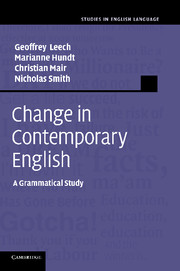Book contents
- Frontmatter
- Contents
- List of figures
- List of tables
- Preface
- Abbreviations and symbolic conventions
- 1 Introduction: ‘grammar blindness’ in the recent history of English?
- 2 Comparative corpus linguistics: the methodological basis of this book
- 3 The subjunctive mood
- 4 The modal auxiliaries
- 5 The so-called semi-modals
- 6 The progressive
- 7 The passive voice
- 8 Take or have a look at a corpus? Expanded predicates in British and American English
- 9 Non-finite clauses
- 10 The noun phrase
- 11 Linguistic and other determinants of change
- Appendix I The composition of the Brown Corpus
- Appendix II The C8 tagset used for part-of-speech tagging of the four corpora
- Appendix III Additional statistical tables and charts
- References
- Index
2 - Comparative corpus linguistics: the methodological basis of this book
Published online by Cambridge University Press: 18 January 2010
- Frontmatter
- Contents
- List of figures
- List of tables
- Preface
- Abbreviations and symbolic conventions
- 1 Introduction: ‘grammar blindness’ in the recent history of English?
- 2 Comparative corpus linguistics: the methodological basis of this book
- 3 The subjunctive mood
- 4 The modal auxiliaries
- 5 The so-called semi-modals
- 6 The progressive
- 7 The passive voice
- 8 Take or have a look at a corpus? Expanded predicates in British and American English
- 9 Non-finite clauses
- 10 The noun phrase
- 11 Linguistic and other determinants of change
- Appendix I The composition of the Brown Corpus
- Appendix II The C8 tagset used for part-of-speech tagging of the four corpora
- Appendix III Additional statistical tables and charts
- References
- Index
Summary
This chapter concentrates on the foundations of corpus linguistics and the methodology used for the investigation of the four corpora (Brown, LOB, Frown and F-LOB) belonging to the Brown family. As explained in Chapter 1, our study of recent grammatical change focuses primarily on these corpora. But there are also other corpora, which extend the study into spoken English or take it further back into the past. For these, the same methodology applies in outline, although there may be some differences. We argue that the present study represents, in some ways, a new kind of corpus linguistics. We can label this comparative corpus linguistics, or more specifically short-term diachronic comparable corpus linguistics. We will seek to explain this somewhat long-winded phrase by starting with the last words ‘corpus linguistics’ and gradually working leftwards to take in the other defining words one by one.
(Computer) corpus linguistics: the Brown Corpus and after
Although the term corpus linguistics was apparently not in use until the 1980s, it is generally agreed that this sub-discipline of linguistics has been in existence longer – at least since the earlier 1960s. The term can be simply defined as ‘the study or analysis of language through the use of (computer) corpora’. The landmark event for the development of corpus linguistics in the modern sense (involving the use of electronic or machine-readable corpora) was the creation of the Brown Corpus by Nelson Francis and Henry Kučera in 1961–64.
- Type
- Chapter
- Information
- Change in Contemporary EnglishA Grammatical Study, pp. 24 - 50Publisher: Cambridge University PressPrint publication year: 2009



